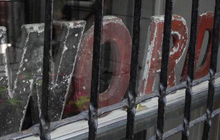Susanna Moore on the Book as Aphrodisiac
(photo: a gift from the author)
My first acquaintance with Susanna just precedes the publication of her first novel, My Old Sweetheart, when we “met cute”. I was selling books at a carriage trade shop on the Upper East Side of Manhattan that several of her friends frequented; our bi-coastal movie clientele, it turned out, all knew her. She was beautiful, new to the neighborhood, on the rebound from a Hollywood marriage. Perfectly charming.
Susceptible as I am to appealing, long of limb, erudite literary brunettes, I made it my business to engage her in the charming cultural banter our merchandise lent itself to. We covered an enormous amount of ground in getting to know one another walking together through the stacks. We started clicking with Axel Munthe and I eventually sent her off with a stack of Grave Digger Jones and Coffin Ed, Chester Himes titles.
She left me with the proofs of My Old Sweetheart to read on my vacation. I was floored. This is not the place for why but it was one on those few and far between literary affairs where one’s experience and sensibility dovetails with another’s.
While our affair was chaste, it was largely due to prior commitments both of us had made, partially due to something in our chemistry being just off. Our age difference had something to do with it This did not prevent us from the sort of salacious flirting that follows. She could overwhelm me.
She has a distinctively high girlish voice. She writes best when she writes the way she speaks. When I first heard it I was taken in. When I read it I was smitten. This is no simple trick and I have great admiration for those who do it well. It made it impossible for me to make a pass at her, though temptations were plentiful.
Once in the basement of Isaac Mendoza Books, once where Ann Street met Theater (Archy & Mehitabel) Alley, she showed me a picture of herself from an issue of Playboy, circa 1963 I think it was. Wearing the perfect little black dress with opera gloves and posed with a cocktail, she was helping her formally attired companion choose from a buffet table. My teenage fantasy girl.
Among Susanna’s charms is her candor. When this interview was conducted Susanna was experiencing the material that would become her most recent novel, In the Cut. She and her daughter Lulu had left the man they’d moved to New York to live with and with whom she’d make the movie Mesmerized.
They’d taken a good-sized duplex in the East 70s. I visited on a sunny weekday afternoon and prefacing this interview, ostensibly about reading, she told me about the detective she was seeing and the character she was basing on him.
I need preface this with a cautionary note: If you were, or you think you might be, offended by the sexually explicit scenes in In the Cut please read no further.
Susanna Moore: I read constantly. Unlike other people, who I admire, I can not read anywhere. I can’t read on the subway or in a doctor’s office, I can’t have music on, I certainly can’t be in a room where someone’s watching television.
I need a long stretch of time because I read for hours and hours and hours. It has to be very quiet. I’m preferably alone. Someone could be asleep in bed next to me, or reading on another chair. I can’t read in most situations. I couldn’t get into bed and turn out the light and fall asleep without reading.
It’s a kind of free space or buffer zone between the conscience and the unconscious. You are transported. It’s a kind of state, a kind of trance. You’ll be reading and you’ll stop and stretch and three hours have passed. Reading can be so ritualistic, so totemic, so specific an experience.
I reread. A friend of mine has a name for people like me. It’s that we’re dodo’s. Not in the sense of being stupid, but that we cling and hold fast to a world that has disappeared by a kind of social and biological Darwinism that says we’re meant to disappear, that we’re meant to progress and go on, and not to reread Tolstoy and Proust every year.
He finds me charming but a bit dodoist. I don’t do it out of nostalgia. I’m not one of those people who read Mapp and Lucia or belong to a reading group. I’ve been rereading Tolstoy and Turgenev.
John Dunne told me that I shouldn’t admit this but I spent a good part of last year rereading all of Faulkner. It was just blissful. I’ve picked up Faulkner at other times in my life and thought, fuck! How can I read this? It’s so mannered, so silly, so dated, so bad. I’m so compulsive that if I’m reading Faulkner I’ve got my map of Yoknapatawpha County, I’m reading architectural books on the old south, I’m looking at other secondary sources. I really steep myself in it. That’s heaven. When I was reading Turgenev I found this wonderful book of photographs of czarist Russia. It’s not just reading. It’s a way to be. A friend of mine calls this hedonistic of me. What did he mean by that?
Kurt Thometz: Your friend might be one of those people who looks upon reading as an unpunished vice and that this is over indulgence. Hedonism’s so unfashionable these days that I probably shouldn’t say this but I like to drink and read. Not in excess but I sometimes think sober reading has its limitations. Whiskey goes well with Ulysses and most of Faulkner. Wine and Proust. I like beer when I’m reading detective stories.
One must be quite careful with mixing intoxicants and to me reading is a kind of intoxicant. I used to think a little marijuana did wonders for one’s appreciation of Beckett’s novels. Read straight it seems to give the mistaken impression of being depressing and gloomy, so some people dismiss him as boring. To me he’s one of the greatest comic writers of all time. Marijuana heightens sensitivity to the tragi/comic irony in Beckett, his repetitiveness has its full effect, the ambiguity’s enhanced, the chaos is articulate. They don’t have a plot that you have to remember. The plays I prefer without the artificial inspiration. Beckett’s exceptional this way. I can’t think of another writer this sort of intoxication enhances.
Susanna Moore: I had aunts who looked on reading like masturbation. It was self-indulgent and slightly dangerous to one. Giving too free a rein to the passions of the imagination. You read too much, they would say. Because of it’s excess. I’m so bad that if I’m reading a lot of nineteenth century novels I find, unconsciously, that I listen to a lot of nineteenth century music. I’m listening to Schumann and Schubert.
KT: I made a tape of everything that inspired Vinteuil’s Sonata: Franck’s Sonata in A Major, Faure’s Sonatas in G and D Minor and his Sicilienne, Saint-Saën’s Sonata No. 1 in D. My Proust tape.
SM: You did? I do exactly the same thing. Now I’m conscious of it and it makes me laugh. If I’m reading La Princesse de Clèves, or Les Liasons Dangereuses, I’m listening to eighteenth century music. I suppose some people would think of this as compulsive but it gives such pleasure doesn’t it?
My parents gave me a charge account at the Honolulu Bookstore that was downtown, a long arduous hot dusty trip from the country by bus. I lived two miles walk past where the bus line ended. It was quite an adventure. An entire summer day spent getting to the bus, riding the bus, getting to Honolulu required changing buses, and then the hours spent selecting those books, then the trip home at nightfall…it was a wonderful day.
If you’re a precocious reader as a child you run out of books. At least I ran out. If you grew up in a small town in the late nineteen-fifties in Hawaii you’d know what I mean about running out of things to read. I had gone through the children’s and the young adult sections of the Wayamaya Public Library by the time I was ten. I was given special permission to take out as many as twenty books at a time and that would last me two or three weeks.
I would take books out of the library in cartons. I had to get special permission to stray, with approval of my choices, into the adult section of the library and when there was something that was considered too advanced I would lie and tell the librarian it was for my mother or my father. After going through everything in the library I would start again. Still the smell of library books gives me a sensation of pleasure and wellbeing, the smell of the glue and those green bindings.
I liked the idea of reading a book someone else had had in their hand, their stains on the pages, but I couldn’t stand reading a book that’d been underlined or notated. That was distracting and intrusive. One’s thrilled to read a book a lover has read before one and underlined it because one’s looking for clues but otherwise it annoys me. Other peoples underlining is incoherent. Why would someone put a big exclamation mark in the margin? It doesn’t seem be in context. Sometimes they’re so incredibly obvious or meaningless. You can’t think why someone would underline the ands and the buts. It makes no sense. It has no meaning.
You read books earlier than you should because, one, you’re curious, two, you run out, and, three, books lead to other books. There are references to good books in good books, because they’re written by readers, that just take you on and on, a never ending wonderful kind of trail. But I did read many things too soon. It often wasn’t until the second or third reading I understood what was going on.
It wasn’t until the third time I read The Sun Also Rises, in my later teens, that I realized the word impotent – which I mispronounced phonetically – referred to sexual inadequacy as opposed to the inability of a man to get a taxi. I though it simply meant inadequate. I had no idea and missed quite an important part of the book. Like the anal intercourse in Lady Chatterley’s Lover. Do you like D.H. Lawrence? It wasn’t until I read it the second time, in my naïveté, that I realized he’d fucked her in the ass.
A book that was a big part of my childhood and a big part of my idea of being a woman, and it would have been considered a kind of pornography that I wouldn’t have been allowed to read had I been discovered with it, was Ovid’s The Art of Love. This was so provocative to me, so seductive. I want to read it again because I’d be very curious as to whether or not it’s erotic to me now.
I remember it has things like, ‘If a woman is so blessed by the gods that her limbs are long and slender she should arrange herself on the couch so that her gown parts at the knee; if a woman is dark haired…; if a woman is fair haired…; if a woman is voluptuous…; if a woman is tall…’ To me this was a primer of pleasure. That was very influential. It’s interesting that the books that were remarkable to me as a child all had to do with sex.
KT: When I was twelve I was arrested for shoplifting a copy of Sacher-Masoch’s Venus in Furs from the Walgreens in the 7-High shopping center in Minnetonka, Minnesota. I’d spent the best part of the afternoon reading the book and had to have it. This is a perfect example of what my father calls, ‘Thinking with your dick’.
I think that’s one of the great reasons adolescence is the best times to read. There are so few people for children to talk about sex with, especially any deviation from the norm. Teenaged d.s.b., as we call ‘deadly semen build-up’ in my family, endeared me to pornography at an early age. Pornography, the good parts at least, bears rereading better than most “great literature.” A good pornographer can really touch his reader. Unfortunately, most of its written for idiots or psychopaths.
SM: A lot of sex in books is about so called perversion: rape, bondage, homosexuality, voyeurism. I suppose reading is voyeuristic. You know what was a great, great source of pleasure for me? The Frederick’s of Hollywood Catalogue.
KT: To me most literary novels just didn’t make the grade when it came to sex. Henry Miller, yes. I’d read everything by him when I was seventeen. D.H. Lawrence, I suppose. I read and reread the passage you’ve referred to in Lady Chatterley’s Lover but I largely dismissed it as too British. Very liberated for its time and place, I suppose, but by my standards dull.
I much preferred Henry Miller’s Sexus. Brooklyn, to me, is sexier than England but not as sexy as France. I’ve always preferred Runaway Teenage Tramp or Stick A Fat Pig to Fanny Hill or My Secret Life. Pornography led me to detective stories, as they too dealt with human passions. By comparison, most quality lit seemed so tame.
SM: So much is tame. Detective stories are very evocative and provocative. Very sexy, very flirtatious, very seductive to women. In detective stories you have aggressive women, you have villainesses and that’s sexy. The women aren’t passive. My favorite women are Eustacia Vye, in Hardy, in The Return of the Native, and Maggie Tolliver in The Mill on the Floss.
What’s so interesting in those books – I noticed this as a child and was quite disturbed by it – all the bad, willful, interesting, passionate, doomed heroines had dark hair, which made me feel great, since I have dark hair. What alarmed me a bit was that they all die. The blondes were the good girls, the rivals for the hero’s affections, and they all lived and got the guy. Whereas my character ended up at the bottom of the weir. Dead.
There was a lesson in that that I learned: there was a price to pay not only for being dark-haired but for being willful. I decided quite early on that being a price I was very happy to pay. Couldn’t wait to pay it.
I grew up at a time when grown-ups not only didn’t tell you anything of importance but they really didn’t talk to you at all. I had very formal relationships with my parents and adults. I had wonderful and passionate relationships with the people who worked for my family and they told me things they probably shouldn’t have told me.
They only knew their world and not the larger world outside that drew me on. I was very unlike my daughter Lulu, who just knows everything, who’s grown up with the tolerance of homosexuality, infidelity, bisexuality, eccentricity, single parents. She thinks nothing of it. She’s heard about it, talked about it, she’s able to be funny about it. She has her own very strict moral code, stricter than mine, that she abides by. I think its fine to go out with married men. She thinks its not fine.
KT: When I read your novel, My Old Sweetheart, I was possibly your ideal reader. I got it. I took it to heart. If the novel you wrote is a mirror readers can see you in, I was the reader through the looking glass. Our stories run parallel to each other. When I read your book, my childhood experiences became lucid to me. I don’t know that I read your book the way anybody else did. I probably have a very inexact memory of what actually happened in your book and couldn’t recount the plot. I read it like a poem.
SM: I wrote it like a poem the first time out. I don’t think it matters much. Have you ever heard five people explain the plot of a book? Nobody agrees. Maybe its not true that we’re immune to literature after the age of twenty. I still read to get knowledge. I tend, as an adult, to read very little new fiction and very little biography. Many grown-ups that you meet say that they only read biographies and histories. Ya, sure! I can’t read biographies.
Men make the statement about not reading fiction proudly, as though its an affirmation of their virility and their masculinity and their intelligence and that fiction’s girl stuff – fantasy. It’s so stupid. And I don’t think its just a few big heads but quite a few. Men find what most women read incomprehensible. It’s pretty incomprehensible to me, too. I don’t understand how women can read those romances. I guess its like soap operas but soap operas are funny. Those romances aren’t.
I don’t ever read to relax; beach books/airplane books. My idea of relaxation would be to reread all the Judge Dee novels. Ninth century China – I guess I am a dodo! – but it’s heaven. Or all of Raymond Chandler. I like Elmore Leonard and I like Charles Williford. He’s funny. I don’t like Jim Thompson. That to me is kitch. Those are for people who live in the Chateau Marmot and think that they’re hip. They’re comic books.
All the rattlesnake-in-the-pussy guys irritate me. Jim Harrison, Harry Crews, Larry McMurtry. Fredrick Exley – does he do it? Thomas McGuane’s a little bit but he’s too white to put snakes in pussies. They’re like city guys who just discovered their dicks while fly fishing – a phallic symbol – or hunting – another phallic symbol.
Then there are those academic novelists: Anita Brookner, Julian Barnes, A.N. Wilson, Byatt, Barbara Pym. Horrible. Talk about somebody who needs to be fucked in the ass! You want them to spend a week on Rikers Island before allowing them to write their next chapter.
At least Jean Rhys you always thought was getting fucked in the ass. She was a cunt. Mean, self-destructive, irresponsible, drunk. Never changed out of her nightgown; cigarette ashes on the cardigan sweater over the nylon nightgown. You can just see her, can’t you? The unmade bed and the empty bottles. But The Wide Sargasso Sea is a great book. A lot of people don’t like it.
KT: My friend Mai Mai Sze contends the butler in The Remains of the Day was Japanese.
SM: I don’t think she’s right but I wish she were because it makes it more interesting. I love Chester Himes but only the detective stories. I remember you giving me a handful of Nigerian market literature that I loved!
KT: Speedy Eric’s Mabel the Sweet Honey That Poured Away, “Her skin would make your blood flow in the wrong direction. She was so sweet and sexy, knew how to romance. Yet it ended at seventeen. And what an end? SO THRILLING.” C.N. Obioha’s Why Harlots Hate Married Men and Love Bachelors, written under the pseudonym, Money Hard, I will give to my son when he gets to be that age.
Nigerian literature, cooked or uncooked, is my passion. Amos Tutuola’s books, with the possible exception of his last, are all great. Cyprian Ekwensi’s vastly underrated. Jagua Nana is the best novel I’ve read about prostitution. I wish I could get my hands on more African pornography. They’re as cliché ridden as most porn but the clichés aren’t so worn. Bingu Matata of Kenya is the best I’ve found so far:
“She met a crazy jerk who couldn’t get his camouflaged artillery to stand up!! Well, with her good help, it found her vibrating lips open, a little lingering squirt but it never solidified like a fossilized bone!!! Funny how smart drunken mugs could be as big as Tetu bulls and still carry a thin weak thread between thighs.” “Cure boredom with sex,” is his motto.
SM: More butt fucking?
KT: They don’t really think of it the way we do. There’s very little homosexuality in sub-Sahara Africa and they’ve always used anal sex as an obvious way to prevent making babies.
SM: People that have always used it as a form of birth control don’t think of it the way others do. So interesting. So many people think its degrading to women and only pleasurable to men.
KT: Absolutely not! I’ve had several girlfriends who’ve loved anal sex.
SM: Why do they?
KT: I don’t know why they do. It’s one of those things you either enjoy or you don’t. One woman friend of mine had never before and it changed her life.
SM: Stop!!!
KT: It’d all been fairly Presbyterian for her up to then and afterwards she preferred it.
SM: Good for her! And she could cum and everything? It shows you that cuming’s all in the head. Don’t you think so? Someone told me about this girl who gave the best blow jobs of anyone because she came as she did it, so it was extremely exciting for the man. I don’t doubt it at all.
This morning there were some workmen here repairing the alarm system up in my bedroom while I took a call from Buck Henry down here. I hadn’t realized the answering machine was broadcasting everything I said and it was unbelievably disgusting stuff about some guy who, when he comes in a gir’s mouth, has the cum put back in his mouth. It was something I had not heard of before. Don’t you think that’s an act of repressed homosexuality? Or onanism at it’s best or worst? Is it common?
KT: It’s hard to get reliable statistics.
SM: Would you turn the tape recorder off? I want to ask you something…
Postscript. 2012.
KT: In 1982, I read the galley of My Old Sweetheart, vacationing at UES plastic surgeon Dr. Gerry Abbott’s remote fisherman’s farmhouse on Block Island with my girlfriend, Georgia Rae Gunn, and her best girlfriend, Deborah Turbeville. The scene, out of one of DT’s Jacobean photos, was conducive to Susanna’s seductive prose but my reading mirrored revelations my mother lately delivered, poolside in suburban Minneapolis, that had to do with the role opium had played in my early youth’s medical addiction.
Proofreading this 30 years later makes me feel my old self. At the time, I lived at 214 East 10th Street, was a Greenwich Village book scout (see her friend Roman Polanski’s The Ninth Gate) and sold books at The Madison Avenue Bookshop, part-time. The shop was Upper East Side chic, as were many of the women who shopped there.
It was there I met the celebs. My clientele were boldface names in Women’s Wear Daily and The Wall Street Journal. Recovering aesthete inebriant of Harvard’s intellectual effete elite, black sheep, Warhol party-boy Arthur Lehmann Loeb’s Madison Avenue Bookshop was a salon for the decision-makers you never voted for. Then the 10021 zip code reputedly had more money than the rest of the United States put together and the Social Register’s geographic center was two blocks south.
The shop was between 69th and 70th, across the street from the Polo Lounge of the Westbury Hotel. Gene Hackman, as Popeye Doyle, can be seen shadowing Fernando Lamas from the vestibule of the bookshop in The French Connection and one morning we breakfasted together in the diner on Lexington and 70th. I started there in 1975, after stints at the Strand and in the used-book stores on 4th Ave. Uptown was something else. Downtown, the girls were one thing. Uptown, they were another.
Halston was on 68th. Issy Miyake on 69th. St. Laurant on 70th. There were the ladies-who-lunched and the ladies-who-wrote. Susanna was exemplary among her literary contemporaries, that included Fran Lebowitz, Jean Stein, Joan Juliet Buck, Andrea de Portago, Francesca Stanfill, Isabelle Eberstadt, Daphne Merkin, Annabel Davis-Goff. I read their galleys and discussed them with the neighbor girls I was seeing, Mickey Katz’s granddaughter, Jennifer, who conveniently lived above the shop, and Sotheby’s girl Jennifer Brown, the double-jointed wit I was so wrong for I was right & visa versa.
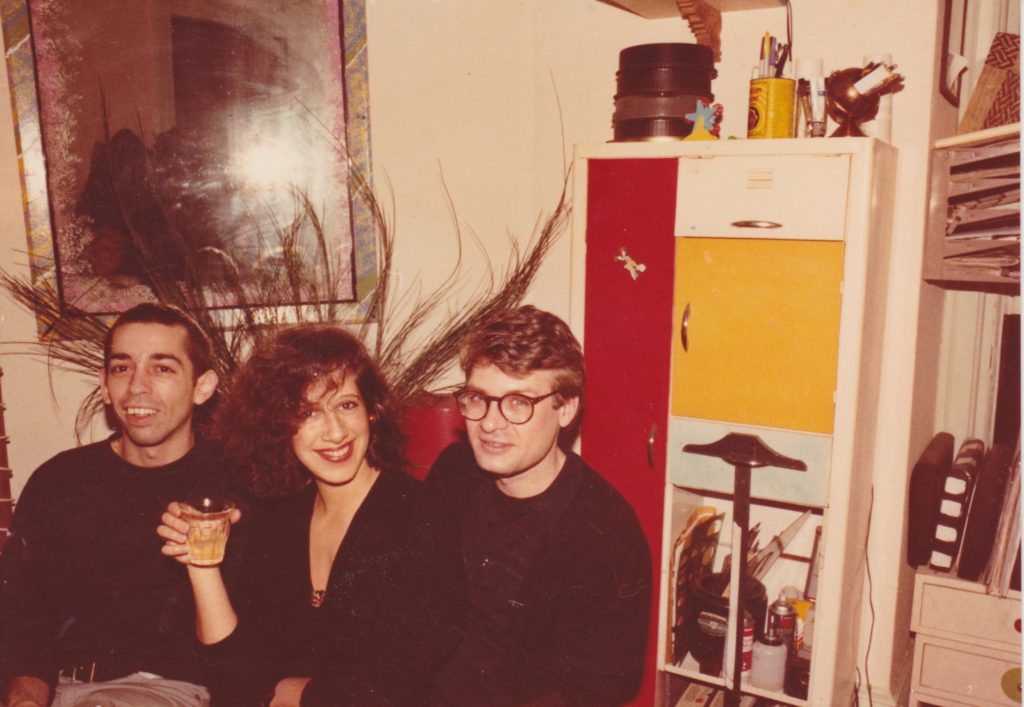 (photo: Adolfo Sanchez, Jennifer Brown et moi, Hotel Belleclaire, 1982)
(photo: Adolfo Sanchez, Jennifer Brown et moi, Hotel Belleclaire, 1982)
There was an older generation of women, some literary, who influenced my reading with their recommendations. No one more so than Mrs. Vreeland but Lili Auchincloss, Mrs. Hilary Patricia Rinehart Barrett-Brown (the former Mrs. Harvey Breit), Louise Melhado, Josephine Hughes, Mai Mai Sze, Irene Sharaff, Francoise de la Renta, Mrs. Astor, Joan Didion Dunne, Shirley Hazzard, Rosemund Bernier, Barbara Tuchman, Kay Lucas and (ever on the phone) the infamous Dorothy Dean.
Collectively they seduced me into reading women, as I never much had before. I’d dozed reading through Jane Austin and the Brontes, surmising women being to marriage what men are to sports. Both were disappointing realizations and so were some of the above but O Susanna! Someone to share my new found love of Jean Rhys, not so long before ‘rediscovered’ through new paperbacks of long out-of-print 1st editions I now knew well enough to buy. We talked books in The Right Bank, Elaine’s, Mortimer’s, Isaac Mendoza Bookshop, Seurkin’s, St. Ambroeus and one night I took her to the Paradise Garage, where we couldn’t talk books but danced. We’d eat in French cafes on side streets all over town and intimately gossip about all the above. Oh, Calhoun, I’d say to myself, walking myself home, You livin’ large now!
There was a time… when one of the advantages of being well read was being a desired guest for cocktails, when Susanna was the new girl in town, when Fran was on the bestseller list, when Rhys, Powell, Hurston, O’Connor, Welty, Gordon, McCullers, Stein, Wharton, Toni Morrison and Willa Cather were the talk of the town. As pretentious as it all sounds, it was a remarkably literate world of becoming women for whom eloquence was elegance. That world was on its last legs about the time I left the shop in 1992. I’d like to live long enough for the Pendulum of Time to swing back to something like it was when I was still a young man. (cue: “Memories are made of this.”)
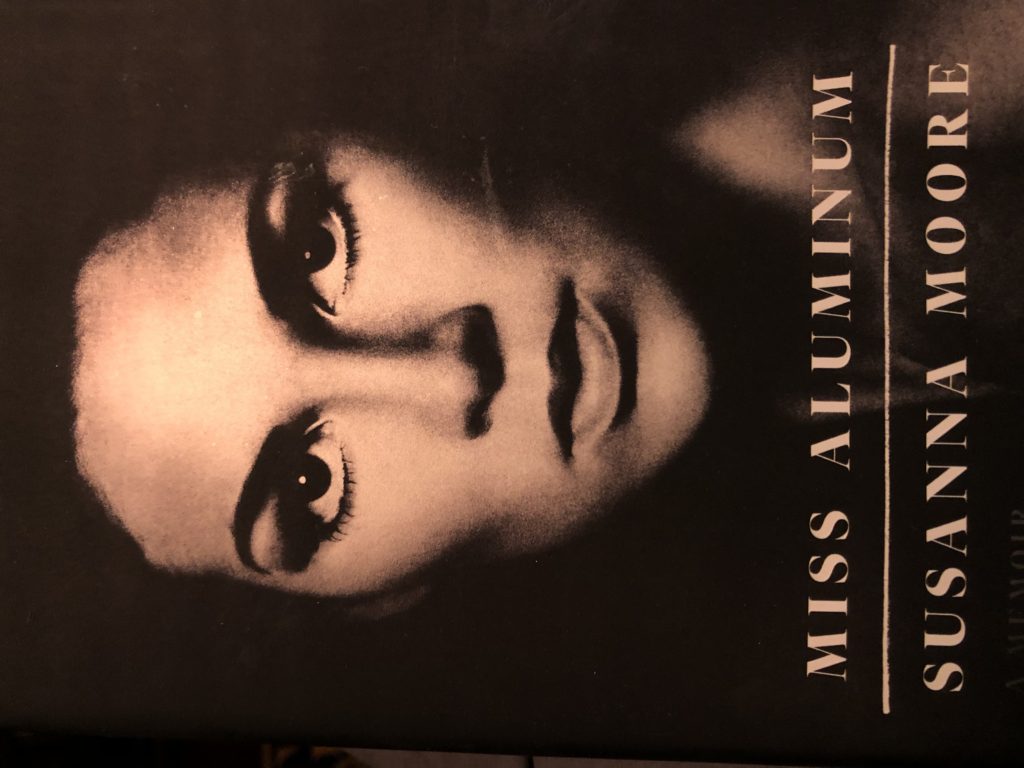
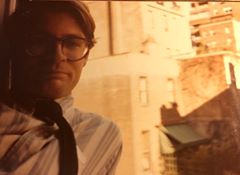
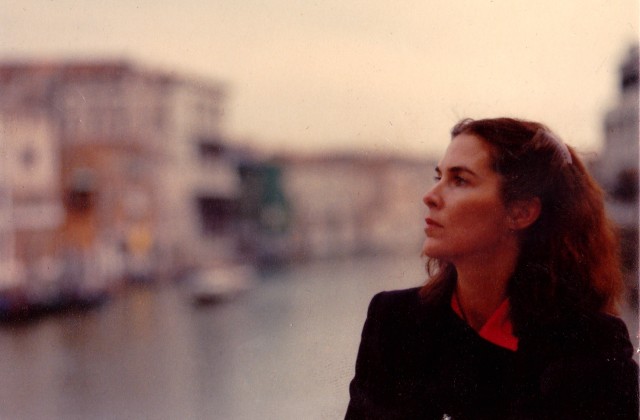
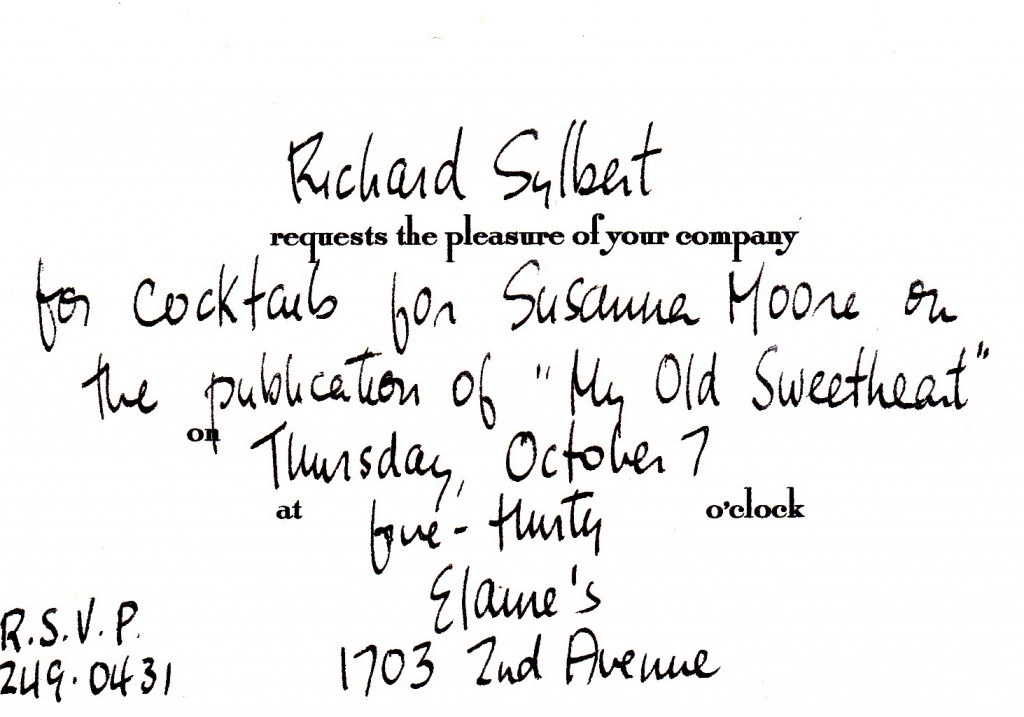
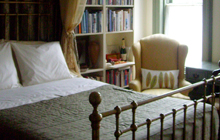 Jumel Terrace B&B
Jumel Terrace B&B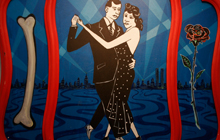 Life Turns Man Up & Down
Life Turns Man Up & Down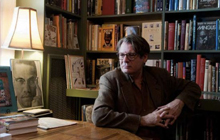 The Private Library
The Private Library